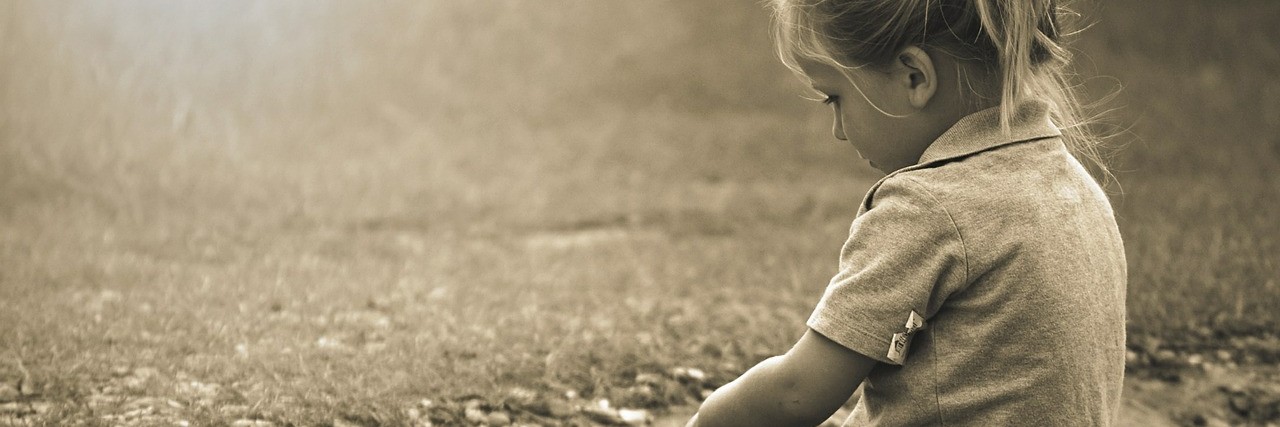It’s been three years, but the moment I received my daughter B’s official diagnosis remains as vivid in my memory as the ladybug costume she wore on her first Halloween and the smile on her face when she learned she’d be a big sister. I remember everything about the chair where I sat while the doctor spoke: the uncomfortable dent in the cushion and the wooden arms I kept knocking my elbows against as I tried in vain to comfortably position my pregnant body.
You never forget the moment when you learn your child has special needs. I knew long before the doctor spoke that something was going on, but hearing the diagnosis left me reeling. I worried for my daughter’s future. I worried how our lives would change with both a new baby and revolving specialist appointments. I worried that I wouldn’t be a strong enough mother to give her what she needed.
Looking back on that moment now, I know her diagnosis was a gift. Until recently, children presenting with her behaviors remained unclassified and untreated because in so many ways, B is “normal.” She’s highly articulate, charming, and smart as a whip. She also couldn’t pull a shirt over her head until she was nearly five and only recently began walking on her heels. She will go from the happiest kid in the room to a sobbing mess in a nanosecond because of a loud noise or an open banana — apparently bananas are the foulest smelling things on the planet.
My daughter has a sensory processing disorder that impacts the way she experiences the world. B is not autistic, at least not by today’s standards, but many of her sensory and anxiety issues are typical of autism. Once we received the diagnosis, we were fortunate enough to have an insurance company that recognized her disorder and assisted with physical therapy, occupational therapy, and traditional therapy. We also live in an amazing school district that classified B as special needs for an inclusive pre-K program combining specials needs and mainstream children.
For the past few years, B and I have crossed between the “special needs” world and the “mainstream” world on a regular basis. One thing I’ve noticed: Special needs parents tend to be more supportive of one another and less judgmental. I’m not saying all special needs parents are beacons of warmth or parents of “perfectly normal kids” (whatever that is) are all insensitive, but special needs parents tend to understand that “bad” behavior is not necessarily a reflection of “bad” parenting. They’ve often been judged harshly, so they tend to reserve judgement whenever possible.
Some days with B are hard, and the only way through them is to lean on someone who has been there. From practical tips on how to build a visual schedule to a shared laugh, cry or combination of the two, I’ve been encouraged by other parents who are all just trying to do the best they can in a challenging situation. And sometimes, I’ve had the privilege to be that shoulder, to give that advice, to help out in some small way. We may have different jobs, educations, religions, political inclinations, and sexual orientations, but if you’re sobbing because your toddler just threw up at the sound of a lawn mower, I’ll be there for you with a box of tissues and a mop. I’ll probably cry with you, because the same anxiety that grips your child so tightly also grips mine.
But here’s the thing: Being less judgmental and more supportive benefits all parents, not just those with special needs children. While it may be easier for parents in the special needs world to not conflate a child’s behavior with a parent’s ability, all parents deserve to be cut some slack and encouraged from time to time, especially when we may not fully understand the situation. Some developmental issues are obvious to other parents. Some, like B’s, are not. Plus, all kids, regardless of their abilities and challenges, have good and bad days. The same can be said for parents.
My daughter’s diagnosis was a gift, because with it I received the support we both needed and the perspective to be more compassionate towards others, regardless of their circumstances. So, as I toe the line between the special needs world and the mainstream world, I will do the best I can to learn from both and find my balance in each.

